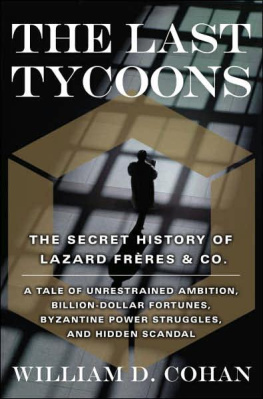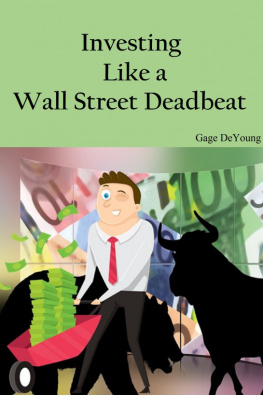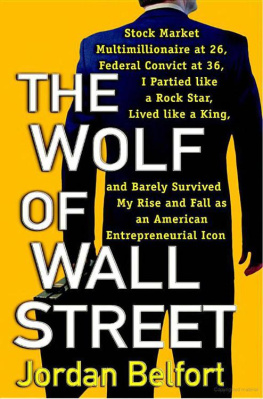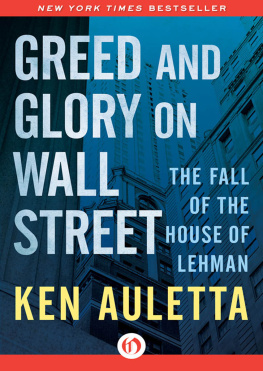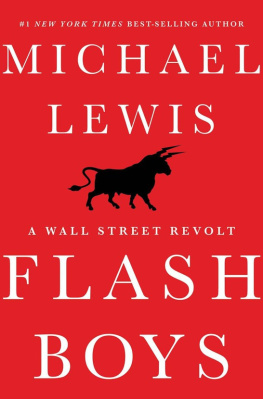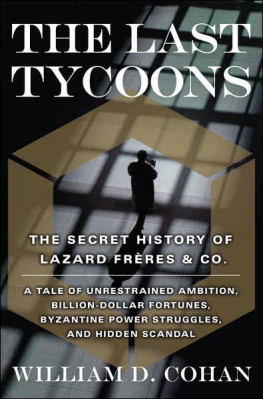


CONTENTS
TO DEB, TEDDY, AND QUENTIN

CHAPTER 1
"GREAT MEN"
E ven among the great Wall Street firms--Goldman Sachs, Morgan Stanley, and Merrill Lynch--Lazard Freres & Co. stood apart, explicitly priding itself on being different from, and superior to, its competitors. For 157 years, Lazard had punched above its weight. Unlike other Wall Street banks, it competed with intellectual rather than financial capital and through a hard-won tradition of privacy and independence. Its strategy, put simply, was to offer clients the wisdom of its Great Men, the finest and most experienced collection of investment bankers the world had ever known. They risked no capital, offering only the raw Darwinian power of their ideas. The better the idea, and the insights and tactics required to achieve the result contemplated by it, the greater was Lazard's currency as a valued and trusted adviser--and the larger were the piles of money the Great Men hauled out of the firm and into their swelling bank accounts. The lucky few men--yes, always men--at Wall Street's summit have always been portrayed as ambitious and brilliant on the one hand and unscrupulous and ruthless on the other. But the secret history of Lazard Freres & Co., the world's most elite and enigmatic investment bank, twists parts of this conventional wisdom into knots of unfathomable complexity. The Great Men chronicled herein amassed huge fortunes--to be sure--but they refused to admit to anyone, least of all to themselves, that their pursuit of these riches led to relentless infighting. Instead they spoke, without irony, of being part of a Florentine guild and of advice whispered to heads of state and to CEOs of the world's most powerful corporations, while all the time attempting to preserve the mythical special idea that was Lazard. They also, to a person, craved an equally elusive chimera: the assurance that somehow, despite everything, they alone had remained virtuous.
But starting in the mid-1980s, the wisdom of Lazard's Great Men strategy began to show its considerable age, especially when Lazard was compared with its better capitalized and more powerful and nimble foes. The firm's numerous strategic missteps were exacerbated by the increasingly titanic generational struggle inside Lazard between the likes of Felix Rohatyn and Steve Rattner--superstar investment bankers and pillars of New York society--as well as by the bizarre behavior of the increasingly isolated and bitter Michel David-Weill, the French billionaire who controlled Lazard and fomented the struggle from his imperial lair. And at the climactic moment, Bruce Wasserstein, the supreme opportunist, came along to pick Michel's considerable pockets. The decades of internal turmoil and paternalistic management led ultimately to the once-unthinkable: a Lazard Freres free from its founders, as a publicly traded company just like any other, its operational flaws and obscene profitability open to the world--its special cachet lost forever.
The story of Lazard has always been one of internecine warfare, calamity, and resurrection, proving definitively that the forces of "creative destruction"--in the Austrian economist Joseph Schumpeter's famous observation--are alive and well to this day in American capitalism.

OF ALL LAZARD'S Great Men, none was greater than Felix George Rohatyn. Felix was considered by many to be the world's preeminent investment banker. He was the man who saved, first, Wall Street and then New York City from financial ruin in the early 1970s. For some thirty years at the end of the twentieth century, he had unofficially presided over Lazard Freres, helping to transform it into Wall Street's most prestigious, enigmatic, and mysterious investment banking partnership. But on one of those impossibly close days in our nation's capital, in the summer of 1997, Rohatyn found himself at the end of his tenure at Lazard, testifying before a Senate subcommittee in hopes of obtaining ratification of his appointment to a position he had long maintained was beneath him.
"It is a great honor for me to appear before you today to seek your consent to President Clinton's nomination of me to serve as the next American Ambassador to France," the sixty-nine-year-old Felix told the Subcommittee on European Affairs of the Senate Foreign Relations Committee. "It is also a very emotional experience, for many reasons.... I am, as you know, a refugee who came to this country from Nazi-occupied Europe in 1942. As long as I can remember, going back to those very dark days, being an American was my dream. I was fortunate to achieve that dream, and America has more than fulfilled all of my expectations. To represent, at this time, my adopted country as her Ambassador would be the culmination of my career; to have been nominated to represent my country in France, a country where I spent part of my childhood and with which I have had a lifelong relationship, both professional and personal, seems to me more than I could ever have hoped for."
In truth, the thick-browed, beaver-toothed Felix had for more than twenty years campaigned relentlessly for more, much more. With absolute clarity of mind, he knew he deserved better than an ambassadorship, a position he once likened to that of butler. Felix was the Great Man of Lazard, Le Corbusier of the most important mergers and acquisitions, or M&A, deals of the second half of the twentieth century, the ultimate rainmaker and corporate confidant, who year after year single-handedly generated hundreds of millions of dollars in fees for himself and his partners, thereby controlling his colleagues through a delicious combination of fear and greed.
After all, who could possibly afford to disobey a man who put so much money into his partners' pockets while taking far less than he was entitled to? When Felix called or wandered through Lazard's spartan offices in One Rockefeller Center, his partners snapped to attention, dropped whatever they might be doing, and acceded to his every wish. As his deal-making prowess continued unabated over the years, he had somehow also found the energy to volunteer his precious time and incomparable insights to solve two of this country's major financial crises of the second half of the twentieth century.
First, in the early 1970s, he worked round the clock to cobble together solutions that stanched the bleeding caused by the "back-office crisis" afflicting many of the largest old-line Wall Street brokerages. Through a series of nail-biting and courageously conceived mergers, Felix prevented the meltdown of a large part of the securities industry. Second, he is credited with almost single-handedly devising the financial rescue package that saved New York City from bankruptcy in 1975, standing tall against President Gerald Ford and his incendiary refusal to help. With these matters resolved satisfactorily, Felix became Hamlet, the lone voice, the Democrat in exile during the fallow years of Ronald Reagan and George H. W. Bush, exhorting the party faithful to action through his regular dispatches in the tony pages of the New York Review of Books , creating what became nothing less than the Rohatyn Manifesto. He courted the great intellectuals and leaders of the day in his genteel salon on Fifth Avenue and at his annual Easter egg hunts at his Southampton manse. He was the epitome of the Great Man.
Next page
